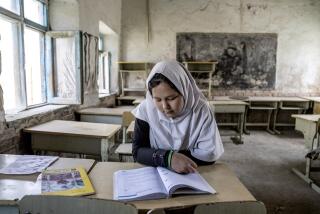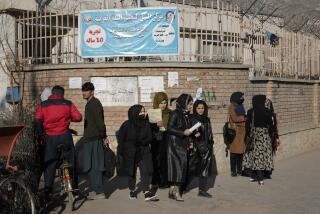Turkey Seeks to Quell Kurd Language Demands; 17 Held
- Share via
ANKARA, Turkey — In a move likely to further jeopardize Turkey’s hopes of joining the European Union, authorities imprisoned 17 students Tuesday as a crackdown continued against Kurds demanding the right to study their own language.
The students were accused by a special state security court of “promoting separatism and inciting racial hatred” by signing a petition calling on their local university to introduce a course on the Kurdish language. They were jailed pending trial in the largely Kurdish province of Malatya in eastern Turkey and face a minimum sentence of three years in prison if found guilty.
The students were acting in concert with about 11,000 ethnic Kurdish students, their families and sympathizers across Turkey who have signed petitions during the last two months in a bid to end constitutional bans on Kurdish language education.
Education in Kurdish is forbidden under the Turkish Constitution, and Education Minister Metin Bostancioglu reaffirmed the government’s position against Kurdish language courses Tuesday.
The government is under pressure from the European Union to offer ethnic Kurds the right to express themselves freely in their own language as a precondition for Turkey’s entry into the economic bloc.
Use of the Kurdish language was banned during military rule in 1980 and has emerged as the main political battleground between Kurdish nationalists and the Turkish government.
The ban on using Kurdish in public places was eased in 1991, but restrictions on broadcasting, publication and education continue to be enforced. Turkish authorities fear that granting such broader language rights would be followed by further demands for autonomy from the country’s estimated 12 million ethnic Kurds and the establishment of an independent Kurdish state in the largely Kurdish southeastern provinces.
Turkey’s three-party coalition government led by Prime Minister Bulent Ecevit charges that the Kurdish language campaign, which began in November, is being orchestrated by the Kurdistan Workers Party, or PKK, to rekindle separatism.
Abdurrahman Demir, a 20-year-old student at Dicle University in the largely Kurdish province of Diyarbakir, said in a recent interview that security forces arrested him last month after he joined the Kurdish language campaign.
“I was stripped naked and beaten by security forces until I signed a confession saying that I had been acting under orders from the PKK,” he said.
Demir signed the confession and is awaiting trial on charges of promoting separatism.
Not all students who have signed the petition have been jailed, but many of them have been expelled by their universities.
Hopes that Turkey would work toward accommodating Kurdish demands rose after the 1999 capture of PKK leader Abdullah Ocalan. A Turkish court sentenced Ocalan to death by hanging the same year, but the government stayed his execution pending a review by the European Court of Human Rights in Strasbourg, France. In return, Ocalan called off the PKK’s 15-year armed campaign for an independent homeland.
Ocalan, who is the sole inmate of an island prison off the coast of Istanbul, now says that lifting bans on Kurdish language education and broadcasting will satisfy the Kurds’ demands for more cultural rights. However, some of his former followers now regard him as a traitor to the cause.
The Ankara government has brushed aside Ocalan’s overtures as a ploy to place the Kurdish issue on an international platform in the context of Turkey’s bid to join the European Union.
Turkey’s parliament passed legislation in October that eased bans on Kurdish language broadcasting but left the education ban in force. Despite the new law, at least two radio stations in Diyarbakir province and the southern Mediterranean port of Mersin received heavy fines in recent months for airing Kurdish songs.
More to Read
Sign up for Essential California
The most important California stories and recommendations in your inbox every morning.
You may occasionally receive promotional content from the Los Angeles Times.











